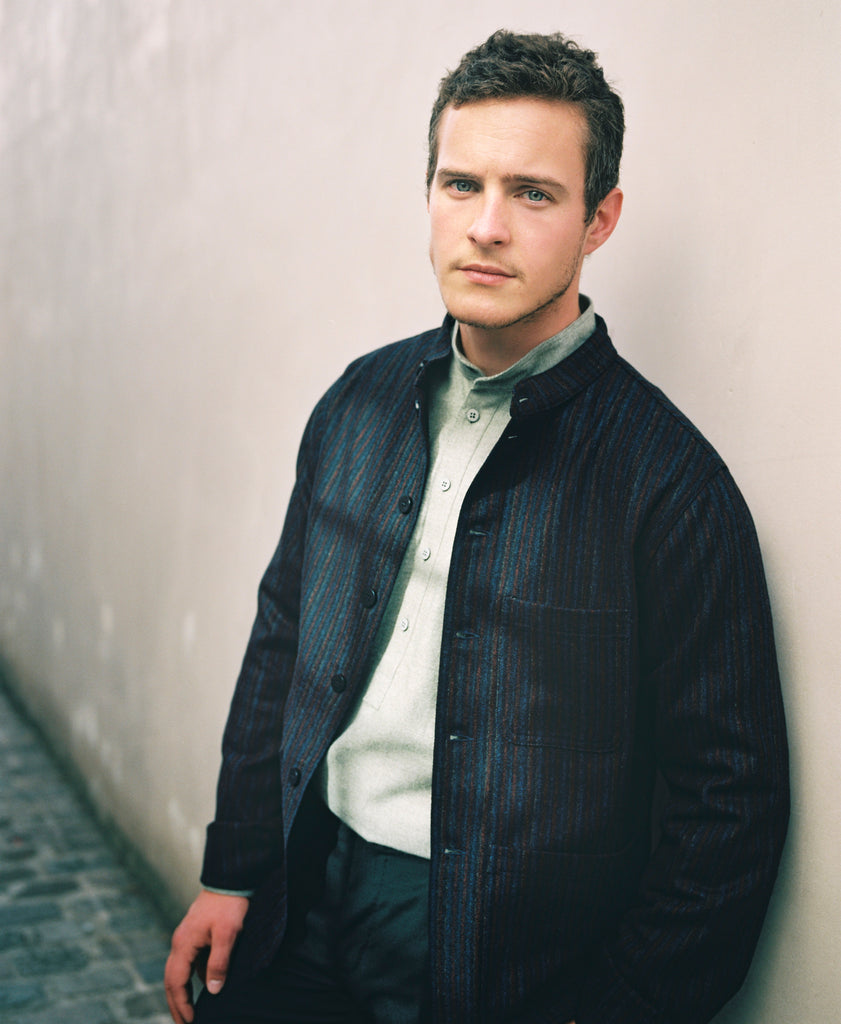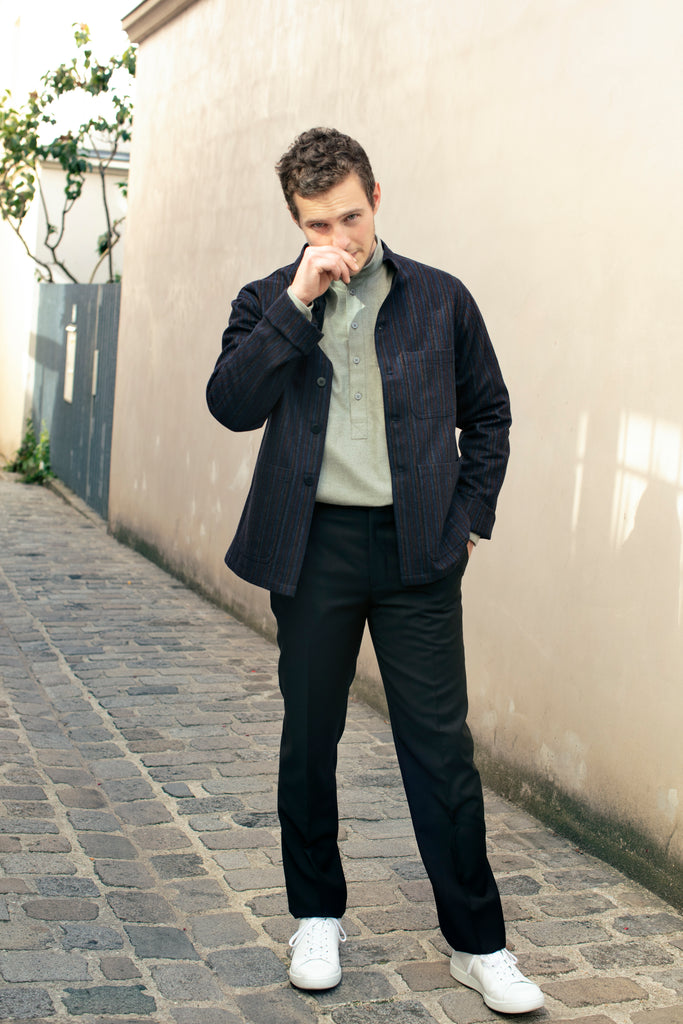Guillaume Arnault, drowning in the role
“What they saw in me was the capacity for instantaneous violence, an explosion of anger that goes off in a split second. I think I was able to show the director that I could have this thing within me that then explodes, that's what he liked. I’m an actor who does not necessarily exude rage at first glance.”

Introduce yourself?
My name is Guillaume Arnault, I am twenty-eight years old, and am an actor.
Where are you from?
My dad was in the military; we travelled a lot through France: Tours, Belfort, Brittany, the Parisian suburbs… I have been living in Paris for over ten years now. This is where I have lived the longest in my life. I liked Brittany a lot too, but today I'm more of a Parisian than anything else.
When did you start playing roles?
I started very late: I was about seventeen. I was still in high school. A neighbour signed me up with an ad agency called Nouvelle Ere, and I began going to casting interviews.
You then entered the famous Cours Simon…
I had never acted in the theatre before that. It was a bit of luck that I found myself there. I didn’t know what to do after high school. I had it more or less in mind to enter the army, like my father and my grandfather ... But the Cours Simon was a very good alternative. I decided to go there and quickly felt good about the choice.
In the first school year, one starts studying classical theatre, and roles that fit one’s personality. In the second year, one starts to practice playing roles for which one is “miscast”. We did modern theatre too, which is quite different. In the third year, one prepares for an end-of-year show in the Théâtre du Gymnase, in Paris. This last year is when one really takes on either difficult roles, or roles that are close to the heart. There was a scene from Cat on a Hot Tin Roof with Paul Newman that I loved very much, but I didn't work on it enough to be allowed to show it, unfortunately. Nonetheless one seeks to find one’s self by the end of these three years.

What have been your most memorable experiences?
Marseille was my first “big” experience, with movie greats. With Gérard Depardieu, Benoît Magimel, Géraldine Pailhas! And shooting Madre was an amazing experience thanks to the Spanish team. The shooting was done almost entirely in long single-sequence takes, with a very wide focal length. It grabbed my heart.
You don't play on stage: It that a choice?
It’s not a choice; maybe it’s fear. I would be happy to give it a go, but I don't know how I would approach the repetition of performances. In film, one can redo a scene several times. On stage, one has to repeat the same lines dozens and dozens of times, and it has to be right every single time. I'm not sure if I’m precise enough for that, therefore I'm not looking for theatre roles yet.
What is your daily routine?
I’m a very patient, very calm person. I don't need to occupy myself to feel alive. I really like video games, I read a little, I watch movies… I exercise a lot too. I come to Arkose (a Parisian climbing gym) several times a week, when my fingers allow me to do so, to stay fit. And I sometimes work in the restaurant business so as not to stay at home for too long, playing video games; one can become stupid.
Who is your favourite playwright?
I really like Tennessee Williams: I read it all, I loved it. It's modern and it always feels as if you're watching a movie! The way he writes is actually a cinema take...

Who are the actors you admire?
I have a great deal of admiration for Depardieu. I like Paul Newman a lot too, and Robert De Niro… I don't know their filmographies by heart, but they do know how to express things. We feel their emotions, you see them evolve and it's extraordinary. Schools are great for learning the basics, the technique. But it's on set that one sees the difference. I loved observing Depardieu: the way he positions himself, how he says his lines, to which line he gives emphasis, how he turns his body in relation to the light. There is something instinctive that develops over time, something that was probably already there at the start, but which is honed by working. Watching people like him is informative. It is an unbelievable experience for a young actor. You are there and you want to copy everything, but of course you have to adapt what you pick up for yourself.
Which director would like to work with?
This is a very difficult question. In fact, I would like to work with Yvan Georges-Dit-Soudril. He’s the friend who gave me a role in my first professional short film. He was the one who revealed me to myself when I was still in Cours Simon. We have a feature film project, Déjà loin, which I hope will come out.
Julien Graber is also a friend with whom I love to work. We really enjoyed shooting Cimer, and a film called Hors Jeu. With him, each experience was very good. I played characters that were a bit complex to work on. Julien knows me very well, he tries to get me out of the bubble I'm isolating myself in and that's really interesting. He knows me too well to let me sit in my quiet corner. He really tries to develop both of us through his films, that is very nice.
What would be your dream role?
I often play baddies who come from a good background, guys who are a bit rotten on the inside, who have been seething with rage for years and years. So I would love to do comedy! I don't necessarily have that funny beat, but I'd love to learn it.
How did the confinement affect you?
It went very well overall. My girlfriend was at home. We were able to take care of our newly adopted kitten, refocus, and meet up together. I also spent a lot of time on video games to get away from the apartment a bit. It was quite curious being in Paris and hearing the birds but not the cars, not to hear that constant noise anymore.

What are your current projects?
The main one is Déjà loin, which I was talking about earlier.
I'm doing a lot of screen tests right now for series, for movies. But I don’t want to speak too soon, because everything can go wrong at the snap of a finger, be cancelled because the set is no longer available. Sometimes you can be given the role in the casting but then the actor playing your dad is no longer available and you no longer fit the profile with the new one, etc. You have to remain phlegmatic, have a lot of patience and take nothing personally. You can perform perfectly in your interview but not get the job because you're blond, you don't have the right height, because your “father” and your “mother” have blue eyes and you not … You have to manage to put that aside, say to yourself “my job is to know my lines and to have worked on this, that and the other. What happens behind the scenes is no longer my responsibility, so we'll wait and see.” Handing over the decision to someone else is difficult because we all want to be in control of what goes on in our lives. In this business, one takes a lot of thrashings, and it can be difficult. But that is how it goes, one has to persevere.
For Madre, I met the director, Rodrigo Sorogoyen and the lead actress, Marta Nieto. An initial casting had already taken place. What they saw in me though was the capacity for instantaneous violence, an explosion of anger that goes off in a split second. I think I was able to show the director that I could have this thing within me that then explodes, that's what he liked. I'm not an actor who necessarily exudes rage at first glance.
How important is the costume to you?
The costume is requested by the director. He has a picture of the character and creates their look with the costume designer. She, or perhaps he – I have to be more inclusive – chooses something that fits the given psychological profile. So, they're going to choose the kind of clothes that the actor wears to fit the character. Afterwards, one can add a little personal touch, say “I think I would be better in this outfit than in that one”. It allows you to switch personality. If I play a lawyer, I'm more comfortable in a great suit: I drown in it. I have flair, I display a rigour that I do not have when I play a chav and wear TN or Reeboks, in street clothes. The costume lends you credibility.
What place do you give to clothes in daily life?
I value my clothes a lot, but I have very few of them. I am not very materialistic. There are some that I like very much and take care of. I'm very clumsy, so I save them for special occasions. I love them, but I couldn't walk around in a special costume every day. I own two jeans, eight T-shirts, four shirts, two jackets, and one pair of shoes.
What is your favourite colour?
Blue, blue-green. I've heard that green brings bad luck in the theatre. That's probably why I am not offered theatre parts (laughs). But it emphasizes the colour of my eyes, so I take advantage of that.

How did you hear about hollington?
I got to know hollington two years ago, modelling for the brand. And I discovered the clothes: when you wear them, they lend you a presence, a charisma, something extra. It's a bit like what I said about playing a role. You feel good in such clothes: a nice shirt, a Mao collar, linen pants, or my jacket – it was a shirt but I ended up wearing it as a jacket every day last summer. All these little hollington things that one can appropriate.
What do you prefer: the shape or the materials?
Can I take both? I will say the material. And the shape: impeccable, perfectly cut. I have big arms, but I don't feel confined. I am comfortable. The shoulders are perfect. And you're lucky to have a gentleman who does extraordinary alterations, Kumar. Kumar is wow.
What part do you imagine yourself playing when wearing hollington garments?
In the grey suit, or in the purple-and-blue one, I see myself as a mafia godfather, really. I'm totally confortable in it, and it looks amazing. Wearing the velvet suit too: The Godfather, yes. Even Peaky Blinders, if I pick the three-piece suit; a pocket watch, and there you go!

Download the lookbook hollington Fall-Winter 2020
We thank Guillaume Arnault warmly for his welcome and the time he so kindly gave us!



